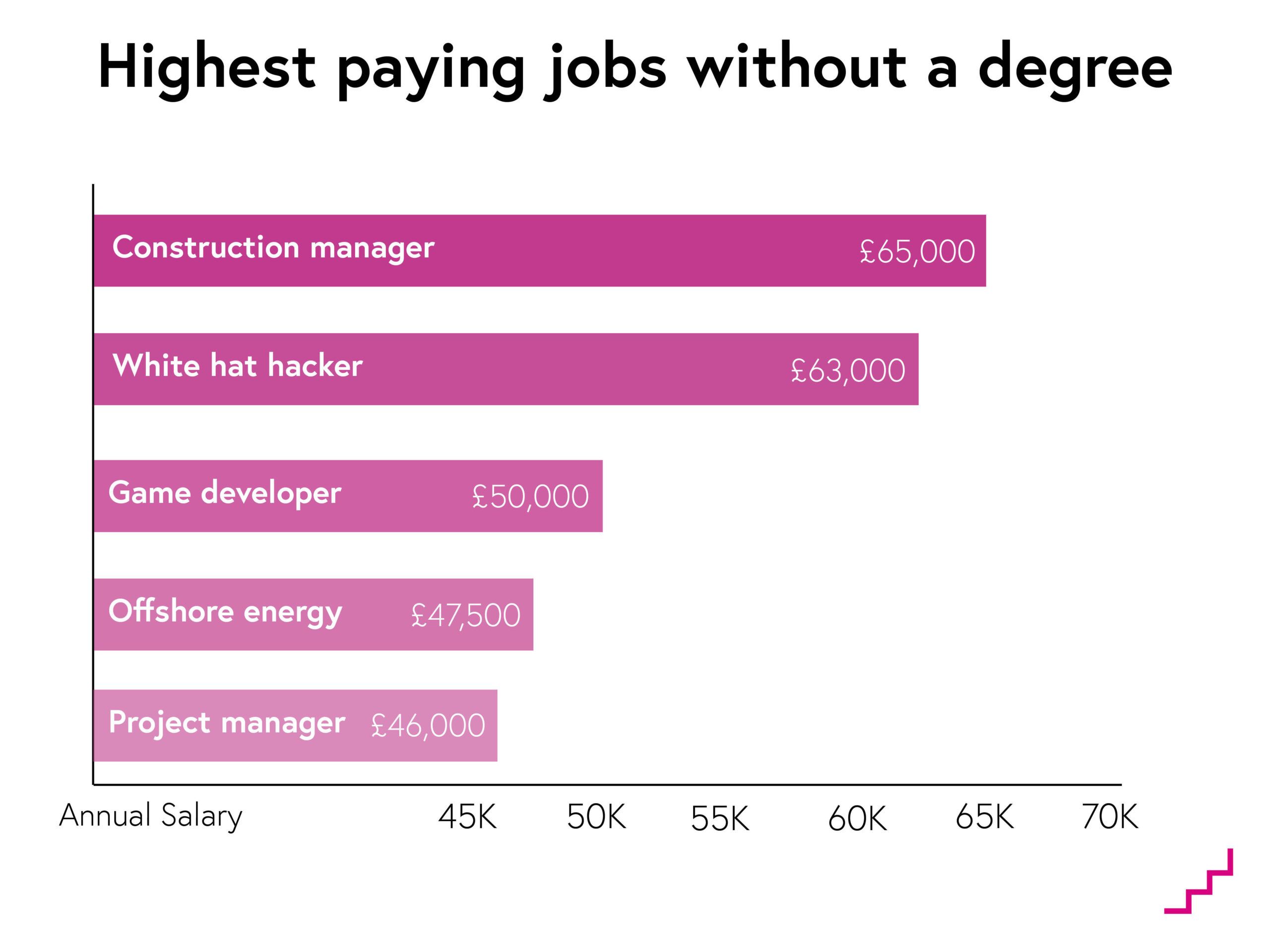Understanding the Factors that Influence Salary
When it comes to determining what job gives the most money, several factors come into play. Industry, location, experience, and education are just a few of the key elements that can significantly impact earning potential. For instance, jobs in the finance and technology sectors tend to offer higher salaries due to the high demand for skilled professionals and the revenue generated by these industries. Location also plays a crucial role, as cities with a high cost of living, such as New York or San Francisco, often offer higher salaries to compensate for the increased expenses.
Experience is another critical factor, as professionals with more years of experience and a proven track record of success can command higher salaries. Education also plays a significant role, as individuals with specialized degrees or certifications can increase their earning potential. For example, a software engineer with a master’s degree in computer science can expect a higher salary than a candidate with a bachelor’s degree. Understanding how these factors interact and impact earning potential is essential for individuals seeking high-paying careers.
According to the Bureau of Labor Statistics, the top-paying industries in the United States include healthcare, finance, and technology. Jobs in these industries often require specialized education and training, but can offer salaries ranging from $100,000 to over $250,000 per year. For instance, physicians and surgeons are among the highest-paid professionals, with median salaries ranging from $208,000 to over $600,000 per year. Similarly, chief executives and financial managers can also expect high salaries, with median salaries ranging from $200,000 to over $1 million per year.
While these figures may seem impressive, it’s essential to remember that salaries can vary widely depending on factors such as location, experience, and industry. However, by understanding the factors that influence salary and pursuing careers in high-paying industries, individuals can increase their earning potential and achieve financial success.
Top Industries for High-Paying Jobs
When it comes to identifying the top industries for high-paying jobs, several sectors stand out. Finance, technology, healthcare, and energy are consistently among the highest-paying industries, offering salaries that can range from $100,000 to over $250,000 per year. For instance, jobs in the finance sector, such as investment banking and financial management, can offer salaries ranging from $150,000 to over $500,000 per year.
In the technology sector, jobs such as software engineering and data science can offer salaries ranging from $120,000 to over $200,000 per year. The healthcare sector also offers high-paying jobs, such as physician and surgeon roles, which can offer salaries ranging from $200,000 to over $600,000 per year. The energy sector, including jobs in oil and gas, can also offer high salaries, ranging from $100,000 to over $250,000 per year.
Some specific job roles and their corresponding salaries in these industries include:
- Investment Banker: $150,000 – $500,000 per year
- Software Engineer: $120,000 – $200,000 per year
- Physician: $200,000 – $600,000 per year
- Petroleum Engineer: $100,000 – $250,000 per year
These figures are based on national averages and can vary depending on factors such as location, experience, and industry. However, by pursuing careers in these high-paying industries, individuals can increase their earning potential and achieve financial success.
It’s worth noting that while salary is an important consideration, it’s not the only factor to consider when choosing a career. Other factors such as job satisfaction, work-life balance, and growth opportunities should also be taken into account. By considering these factors and pursuing careers in high-paying industries, individuals can set themselves up for long-term success and financial stability.
The Role of Education and Skills in High-Paying Careers
Education and skills play a crucial role in securing high-paying jobs. Specialized degrees, certifications, and training programs can significantly boost earning potential. For instance, a degree in computer science or engineering can lead to high-paying job opportunities in the technology sector. Similarly, a degree in medicine or law can lead to high-paying job opportunities in the healthcare and legal sectors.
In addition to formal education, skills such as data analysis, programming, and digital marketing are highly valued in today’s job market. Professionals with expertise in these areas can command high salaries and enjoy greater job security. Furthermore, certifications such as ITIL, PMP, or Six Sigma can demonstrate expertise and commitment to a particular field, making individuals more attractive to potential employers.
Training programs and online courses can also provide individuals with the skills and knowledge needed to succeed in high-paying careers. For example, online courses in data science, artificial intelligence, or cybersecurity can provide individuals with the skills needed to pursue high-paying job opportunities in these fields. Moreover, professional certifications such as Google Analytics or HubSpot can demonstrate expertise in digital marketing and increase earning potential.
Some of the highest-paying jobs that require specialized education and skills include:
- Software Engineer: $120,000 – $200,000 per year
- Data Scientist: $100,000 – $170,000 per year
- Physician: $200,000 – $600,000 per year
- Lawyer: $150,000 – $250,000 per year
These figures are based on national averages and can vary depending on factors such as location, experience, and industry. However, by investing in education and skills, individuals can increase their earning potential and pursue high-paying careers.
In conclusion, education and skills are essential for securing high-paying jobs. By pursuing specialized degrees, certifications, and training programs, individuals can demonstrate expertise and commitment to a particular field, making them more attractive to potential employers. By investing in education and skills, individuals can unlock their earning potential and pursue high-paying careers.
How to Increase Your Earning Potential
Increasing earning potential requires a combination of skills, knowledge, and strategic planning. One of the most effective ways to boost earning potential is through networking. Building relationships with professionals in your industry can lead to job opportunities, mentorship, and access to valuable resources. Attend industry events, join professional organizations, and connect with people on LinkedIn to expand your network.
Professional development is also crucial for increasing earning potential. Pursue certifications, training programs, and continuing education courses to enhance your skills and knowledge. This will not only make you more attractive to potential employers but also increase your confidence and competence in your field.
Negotiation techniques are also essential for increasing earning potential. When negotiating salary, be prepared to make a strong case for your worth. Research the market rate for your position, highlight your achievements and qualifications, and be confident but respectful in your approach.
Other strategies for increasing earning potential include:
- Developing a personal brand: Establish an online presence, create a professional website or blog, and showcase your skills and expertise.
- Building a strong portfolio: Create a portfolio that showcases your work, achievements, and qualifications.
- Seeking out new opportunities: Be open to new job opportunities, and be willing to take calculated risks to advance your career.
By implementing these strategies, individuals can increase their earning potential and achieve financial success. Remember, increasing earning potential is a long-term process that requires dedication, hard work, and strategic planning.
In addition to these strategies, it’s also important to stay adaptable and open to new opportunities. The job market is constantly changing, and being able to pivot and adjust to new circumstances is crucial for success. By staying flexible and open-minded, individuals can increase their earning potential and achieve their career goals.
The Highest Paying Jobs Across Various Sectors
Across various sectors, there are several high-paying jobs that offer lucrative salaries and benefits. Here are some of the highest paying jobs across different sectors:
Finance Sector:
- Investment Banker: $150,000 – $500,000 per year
- Financial Manager: $120,000 – $300,000 per year
- Portfolio Manager: $100,000 – $250,000 per year
Technology Sector:
- Software Engineer: $100,000 – $200,000 per year
- Data Scientist: $120,000 – $250,000 per year
- Product Manager: $150,000 – $300,000 per year
Healthcare Sector:
- Physician: $200,000 – $600,000 per year
- Dentist: $150,000 – $300,000 per year
- Pharmacist: $120,000 – $250,000 per year
Energy Sector:
- Petroleum Engineer: $100,000 – $250,000 per year
- Renewable Energy Engineer: $80,000 – $200,000 per year
- Energy Trader: $150,000 – $300,000 per year
These figures are based on national averages and can vary depending on factors such as location, experience, and industry. However, these jobs are consistently among the highest paying across various sectors.
In addition to these jobs, there are many other high-paying careers across various sectors. It’s essential to research and explore different career options to find the best fit for your skills, interests, and goals.
Breaking into High-Paying Careers: Overcoming Challenges
Breaking into high-paying careers can be challenging, especially for individuals who lack experience or education in their desired field. However, with the right strategies and mindset, it is possible to overcome these obstacles and achieve success.
One of the most significant challenges individuals may face is lack of experience. Many high-paying careers require specialized skills and experience, which can be difficult to obtain without prior experience in the field. To overcome this challenge, individuals can consider internships, volunteer work, or entry-level positions that can provide valuable experience and skills.
Another challenge individuals may face is lack of education or training. Many high-paying careers require specialized degrees or certifications, which can be expensive and time-consuming to obtain. To overcome this challenge, individuals can consider online courses, certification programs, or vocational training that can provide the necessary skills and knowledge.
Networking is also a crucial aspect of breaking into high-paying careers. Building relationships with professionals in your desired field can provide valuable insights, advice, and job opportunities. Attend industry events, join professional organizations, and connect with people on LinkedIn to expand your network.
Additionally, individuals can consider working with a career coach or mentor who can provide guidance and support in achieving their career goals. A career coach or mentor can help individuals identify their strengths and weaknesses, develop a career plan, and provide valuable advice and insights.
Some specific strategies for breaking into high-paying careers include:
- Identifying transferable skills: Highlighting skills and experience that can be applied to different industries and job roles.
- Building a strong personal brand: Creating a professional online presence, including a LinkedIn profile and personal website or blog.
- Developing a niche expertise: Specializing in a specific area of expertise to increase earning potential and job prospects.
By overcoming these challenges and implementing these strategies, individuals can increase their chances of success and achieve their career goals.
Staying Ahead in High-Paying Careers: Continuous Learning and Adaptation
Once you’ve secured a high-paying career, it’s essential to stay ahead of the curve to maintain your earning potential. Continuous learning and adaptation are crucial in today’s fast-paced job market. With technological advancements and industry trends changing rapidly, it’s essential to stay up-to-date with the latest developments in your field.
One way to stay ahead is to pursue ongoing education and training. This can include attending conferences, workshops, and seminars, as well as pursuing certifications and advanced degrees. By investing in your education and skills, you can increase your earning potential and stay competitive in your field.
Another way to stay ahead is to stay adaptable. Be open to new opportunities and challenges, and be willing to pivot when necessary. This can include taking on new responsibilities, switching to a new industry or role, or even starting your own business.
Some specific strategies for staying ahead in high-paying careers include:
- Staying current with industry trends: Follow industry leaders and publications to stay informed about the latest developments in your field.
- Building a professional network: Connect with other professionals in your industry to stay informed about job opportunities and best practices.
- Pursuing ongoing education and training: Invest in your education and skills to stay competitive in your field.
By staying ahead of the curve and continuously learning and adapting, you can maintain your earning potential and achieve long-term success in your high-paying career.
In addition to these strategies, it’s also essential to stay organized and focused. Use tools like to-do lists and calendars to stay on top of your work and prioritize your tasks. By staying organized and focused, you can achieve more in less time and increase your earning potential.
Conclusion: Unlocking Your Earning Potential
In conclusion, unlocking your earning potential requires a combination of hard work, dedication, and strategic planning. By understanding the factors that influence salary, identifying top industries for high-paying jobs, and developing the necessary education and skills, individuals can increase their earning potential and achieve financial success.
Additionally, staying ahead in high-paying careers requires continuous learning and adaptation. By staying up-to-date with industry trends, technologies, and best practices, individuals can maintain their earning potential and achieve long-term success.
Remember, achieving financial success is not just about finding a high-paying job, but also about creating a fulfilling and sustainable career. By following the tips and strategies outlined in this article, individuals can unlock their earning potential and achieve their career goals.
So, what job gives the most money? The answer is not a simple one, as it depends on a variety of factors, including industry, location, experience, and education. However, by understanding the factors that influence salary and developing the necessary skills and education, individuals can increase their earning potential and achieve financial success.
In the end, it’s up to each individual to take control of their career and earning potential. By making informed decisions, staying adaptable, and continuously learning and growing, individuals can unlock their earning potential and achieve their career goals.








